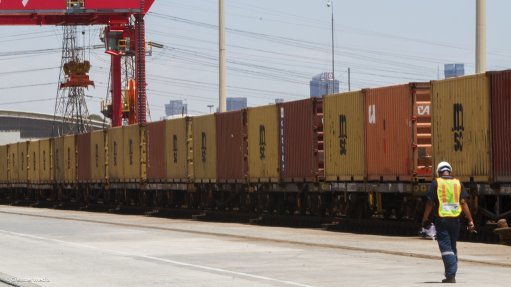
City Deep terminal to be included in the 20-year operational lease.
Photo by: Creamer Media
Transnet Freight Rail (TFR) has extended, to the end of May, the deadline for responses to a request for qualification (RFQ) regarding the proposed 20-year operating lease that the State-owned rail utility is offering for its underperforming and crime- ridden container corridor between Durban and Johannesburg.
When the RFQ was initially issued on January 27, a closing date of March 31 was provided.
TFR chief commercial officer Bonginkosi Mabaso tells Engineering News & Mining Weekly that the deadline was extended in response to requests from potential participants, including those who attended a noncompulsory briefing session on the RFQ on February 17.
The new timeframe being pursued by TFR is as follows:
- rFQ closure by the end of May;
- governance approvals for the launch of the request for proposals (RFP) phase on July 2;
- rFP submission deadline of October 31;
- governance approvals and award of RFP by December;
- transaction approval under the Public Finance Management Act on January 15, 2024; and
- handover to lessee on February 28, 2024.
Transnet is proposing to lease the corridor, as well as the terminals at City Deep, Kascon and Bayhead, for 20 years, with the proviso that the lessee invests R5.5-billion to rehabilitate the corridor and retains the current employees on the corridor.
Mabaso explains that the contracts of employees will remain with Transnet, but employees will form part of the lease through a personnel service agreement that will be concluded between Transnet and the lessee.
He acknowledges that both TFR’s recognised trade unions have expressed anxiety over the proposed development, with their major concern relating to job security.
“Transnet has assured employees and unions that, given the fact that the contracts of employment of employees would remain with Transnet, job security will not be impacted,” he tells Engineering News.
The corridor’s network and rolling stock will be part of the lease, but Mabaso says it is premature to state for certain whether the yet-to-be-created TFR Infrastructure Manager (IM) will be responsible for the network once the operational lease is awarded.
“These details are being determined within the RFP and cannot be disclosed as it is a procurement process,” he says, adding that the IM is expected to be operational by October.
By entering an operating lease, TFR is hoping to not only staunch losses on the corridor, but also recover volumes lost to road over the last number of years and to tackle ongoing crime.
TFR told lawmakers earlier this year that it had accumulated losses of R19.6-billion between 2011 and 2022 on the corridor, with R3.4-billion of that amount arising in 2022 alone.
In addition, 44% of all cable theft and vandalism incidents within TFR for the 2021/22 financial year occurred on the corridor, a trend that Mabaso says remained consistent during the 2022/23 financial year.
“On average there are between four and five incidents per day and for the period from April 2022 to February 2023 a total of 445 km of cable was stolen on the corridor.”
Obviating the cable theft problem by replacing electric locomotives with diesel is complicated by a lack of ventilation in certain tunnels on the corridor. But Mabaso says this issue could be addressed by the awarded lessee if they wish to run diesel locomotives or a combination of diesel and electric traction.
Likewise, no limitation will be placed on the use or development of inland ports, as the lessee will be responsible for the corridor for the period.
Volumes have declined in tandem with rising costs and crime, falling from 437 000 twenty-foot equivalent units (TEUs) in 2018 to only 300 000 TEUs in 2021, a year that was also disrupted by Covid and the July riots in KwaZulu-Natal and Gauteng.
“The lessee is expected, as per the RFQ, to commit to a minimum additional volume of 500 000 TEUs per annum,” Mabaso tells Engineering News & Mining Weekly.